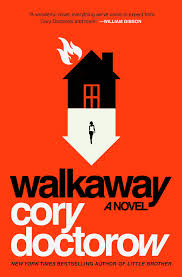Cory Doctorow
Tor

|
Zottas (the rich) cooked the process so they get all the money and own the political process, pay as much or as little tax as they want. Sure, they pay most of the tax, because they’ve built a set of rules that gives them most of the money. Talking about “taxpayers” means that the state’s debt is to rich dudes, and anything it gives to kids or old people or sick people or disabled people is charity we should be grateful for, since none of those people are paying tax that justifies their rewards from Government, Inc. from Walkaway |
If you read only one dystopian novel this summer...
Dystopian fiction is once again in vogue (and I’m sure we all know why.) Anti-utopian classics like George Orwell’s 1984 and Margaret Atwood’s The Handmaid’s Tale are back on the bestseller lists. Atwood’s grim tale is now also a TV series, and the recent film, “The Circle,” based on Dave Eggers’ novel about a Google-like utopia, warns us to be wary of any benevolent Big Brother from Silicon Valley, even lovable Tom Hanks.
Cory Doctorow (Little Brother, Homeland) in his new novel imagines a “post-scarcity world” in the not too distant future where people’s basic physical needs are met. There is little work available since most functions and services are now automated, leaving people to feel, as one character says, “like a happy android.” Except people are not happy.
As Jesus once implied, the rich will always be with you, and there is still a huge divide between the super-rich (called the Zottas) and everybody else. Zottas run the game and write the rules. However, there are groups of people who decide “the only way to win was not to play.” They are called Walkaways, and they leave the “default society” to set up their own communes.
Among the newest Walkaways are three young people: a character with twenty-one names called Hubert, Etc. for short; Seth, a perpetually libidinous seventeen-year old regardless of his actual age; and Natalie, a child of the Zottas who has rejected her father’s world. She tells him, “We’re not making a world without greed, Jacob. We’re making a world where greed is a perversion.”
Amid these various groups of Walkaways are also a number of techno-geeks and scientists who are on the verge of something big: Immortality, no less. They are achieving this not by extending the body’s maintenance—for example, replacing one’s heart when the old one wears out—but by making the body irrelevant. One can now live forever—at least one’s brain-consciousness, though without one’s brain. (Think uploading your brain to the Cloud.)
Like Aldous Huxley (Brave New World,) Doctorow is one of those writers of speculative fiction for whom the story almost seems secondary to the ideas he wants to explore. Part of the enjoyment reading him comes in following the hard science that theoretically could realize such possibilities, taking these futuristic ideas to their logical—or illogical and possibly unpleasant—conclusions.
Indeed, the greater question hovers unasked over this work: Who would want to extend their lives in such a dystopian world?
This review first appeared in The Columbia River Reader (July 15-August 14, 2017.) Reprinted with permission.



